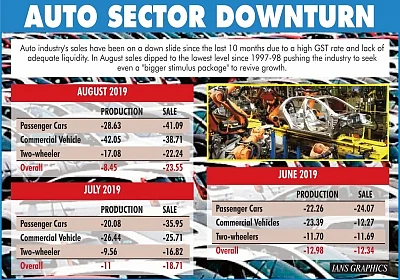New Delhi, Sep 9 (IANS) The ongoing consumption slowdown that has gripped the Indian economy dragged down the automobile industry's August sales to the lowest level since 1997-98, leading to the sector seeking even a "bigger stimulus package" to revive growth.
The demand for another stimulus arose after August's sales data showed that overall sectoral offtake in the domestic market has plunged 23.55 per cent. This level of downturn was witnessed only once earlier, in December 2000, when the de-growth was registered at 21.81 per cent. The available data series commences from 1997-98.
At present, the industry's sales have been on a downslide since the last 10 months due to a high GST rate and lack of adequate liquidity. It had recorded a slump of 18.71 per cent in July, the highest monthly sales de-growth in the last 19 years.
A million contractual manufacturing jobs are at risk due to the consumption slowdown which has forced value-chain operators across the automobile industry to reduce production levels.
"The data in the month of August only highlights the urgent need for government to come out with some kind of a bigger stimulus package and to stregthen the stimulus that has already been given by giving the industry a reduced GST rate from 28 to 18 per cent," Society of Indian Automobile Manufacturers (SIAM) Director General Vishnu Mathur said in a video message.
"We do not have much time, in case we miss on this opportunity, the festival season will also probably not be good, so we have to look at the festival season before we take decision now to reduce GST and to announce a scrappage policy which will help the industry in reviving its fortunes."
Finance Minister Nirmala Sitharaman had earlier announced several measures to rescue the auto sector including lifting ban on purchase of vehicles by government departments, and allowing additional 15 per cent depreciation on vehicles acquired from now till March 2020.
On Monday, data furnished by the SIAM showed that total sales of the Indian automobile sector declined by 23.55 per cent in August to 1,821,490 units, from 2,382,436 units sold during the corresponding month of the previous year.
Passenger car sales in the month under consideration plunged by 41.09 per cent to 115,957 units, against 196,847 units sold in August 2018.
Utility vehicle sales declined by 2.2 per cent to 71,478, whereas vans' offtake went down by 47.36 per cent to 9,089 units against that in the same month a year ago.
Overall, passenger vehicle sales declined by 31.57 per cent in August to 196,524 units against 287,198 units in the corresponding month a year ago.
In the commercial vehicle segment, sales were down by 38.71 per cent to 51,897 units.
The sale of three-wheelers in August declined by 6.93 per cent to 58,818 units.
In the case of two-wheelers, which include scooters, motorcycles and mopeds, the sale edged lower by 22.24 per cent to 1,514,196 units.
However, exports across categories were higher by 2.37 per cent at 421,107 units.
The sales decline has also dented production levels, causing job losses. The domestic passenger car production has fallen by 28.63 per cent to 182,495 units from 255,717 units.
Similarly, commercial vehicle production has come down by 42.05 per cent to 54,873 units, and two-wheeler production has edged lower by 17.08 per cent to 1,858,305 units.
"Despite a strong negative growth overall for passenger vehicles, utility vehicles have done reasonably well with minimum negative impact because of new introductions,"
Grant Thornton India LLP Partner Sridhar V. told IANS.
"Impact of measures undertaken to increase liquidity by the government is yet to be felt."
--IANS
rv/vd
(At The Quint, we question everything. Play an active role in shaping our journalism by becoming a member today.)
